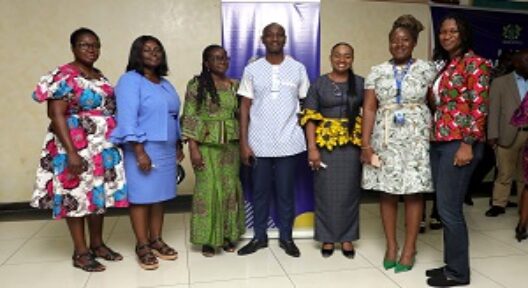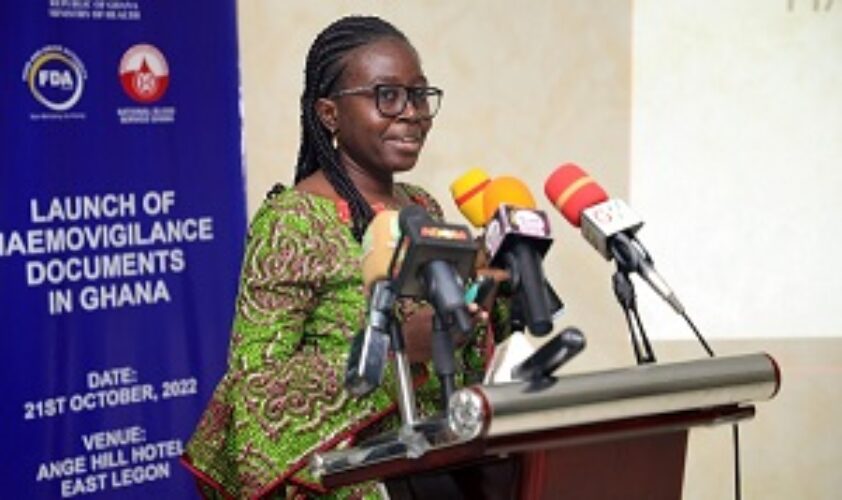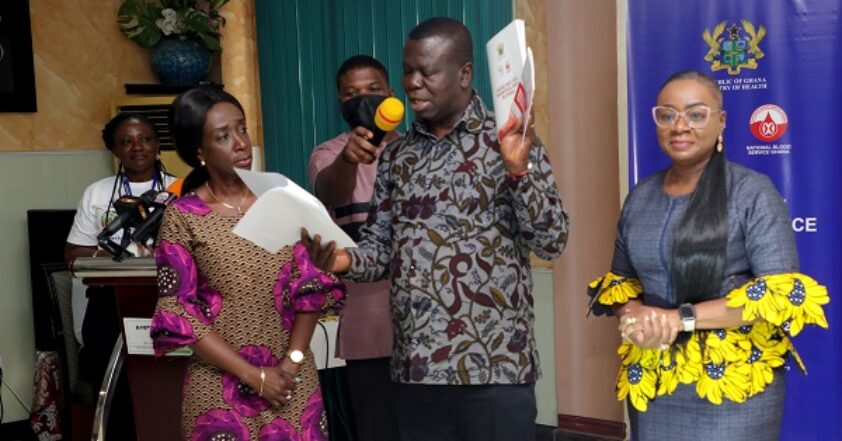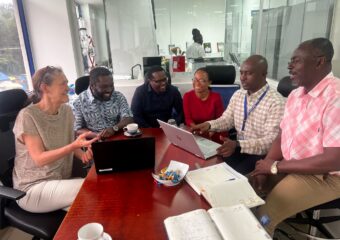Milestone for a Safe Blood Supply: Harmonized Haemovigilance Rules in force Nationwide in Ghana
In Ghana, harmonized and practicable regulatory structures for haemovigilance have come into force. They will help to effectively monitor the entire blood transfusion chain: The National Haemovigilance Framework for Ghana and Guidelines for Haemovigilance in Ghana have been presented to representatives from the government, the health sector and the public in Accra on October 21, 2022. Both documents were developed from inception since June 2020 with support from the Paul-Ehrlich-Institut’s (PEI) BloodTrain as part of the Global Health Protection Programme (GHPP). The launch marks an important milestone for strengthened blood regulation in Ghana. What the project partners from Ghana and the BloodTrain team consider essential for this success is outlined below and can be heard in the interviews.

BloodTrain Haemovigilance Technical Support: Key Steps to Launch
- Agreement with the partner country on the major next steps and processes.
- Formation of a small team; the so-called Haemovigilance (HV) Task Team. In this team, all stakeholder groups of the partner country relevant for haemovigilance are represented: The Food And Drugs Authority – FDA Ghana, the National Blood Transfusion Service (NBS) Ghana and the hospital transfusion centers, as well as BloodTrain.
- The existing haemovigilance system in Ghana was analyzed. The HV Task team agreed on the next steps and developed the draft documents:
- First, the National Haemovigilance Framework for Ghana as a basic structure for roles, responsibilities, and reporting procedures.
- Second, in 2021 and 2022 the much more detailed Guidelines for Haemovigilance in Ghana was developed as a very specific working document for health workers.
The first HV Task Team meeting in Ghana was held on June 26, 2020. Approximately 16 mostly virtual meetings followed in 2020 and 2021 until finally, the nationwide launch of the new harmonized haemovigilance system in Ghana in October 2022.
- Early stakeholder engagement: the HV Task Team presented the draft documents to a wider audience in two stakeholder meetings. This is a very important step that seeks the involvement, agreement, and acceptance of relevant stakeholders in haemovigilance and opens the opportunity for participation and discussion.
- The first stakeholder meeting was held in November 2020 on the National Haemovigilance Framework for Ghana.
- The second stakeholder meeting on the Guidelines for Haemovigilance in Ghana was held in November 2021. See interviews I&II about the critical steps in development of the documents:
- Facilitation and technical expertise provided by the BloodTrain team at PEI. This support was only made possible by the Global Health Protection Programme (GHPP). The BloodTrain’s technical expertise in haemovigilance, especially on internationally adopted standards and the experience from other countries contributed to the success. See Interview III about the role of BloodTrain:
Launch: Official launch of the new haemovigilance documents for Ghana
The official launch of the National Haemovigilance Framework and Guidelines was held with leadership from all key stakeholders in haemovigilance on October 21, 2022 in Accra. Mrs. Delese Mimi Darko, Chief Executive Officer of the Food and Drug Administration (FDA) Ghana, opened the event along with Dr. Shirley Owusu-Ofori, Acting Chief Executive Officer of the National Blood Service Ghana.
Mrs. Darko emphasized that the launch of these documents, which are so important to Ghana, was only possible through the joint commitment of the National Blood Service and the Drug Authority. She emphasized that the new guidelines are a workable document for all healthcare professionals and that this is critical for timely reporting. She also made a strong plea for an open culture of error and rapid reporting of events. She said it is essential that this is done without fear, shame or punishment.
Dr. Owusu-Ofori noted that, to date, only 40 percent of African countries have a national haemovigilance system. She pointed out that Ghana has made history by joining other countries in Africa that have developed their own haemovigilance systems.
The BloodTrain participated virtually, including a speech by Dr. Jens Reinhardt, BloodTrain’s deputy project lead. He reiterated the support of the BloodTrain for further implementing the documents into practice in Phase II of the GHPP.


More about the launch
The entire launch was recorded by media representatives and broadcast live online.
- Link to the recording of the launch
Press article with more voices on the launch
- News Ghana (online): ‘FDA, NBS launch haemovigilance documents to ensure safety of blood products”, 22 October 2022, Link
More information
For more information about the project, please contact us by e-mail at bloodtrain@pei.de.
Date: December 2022


